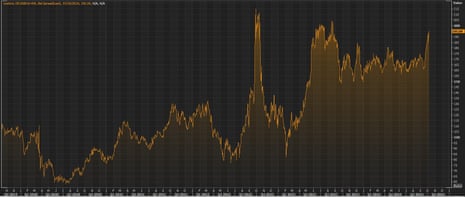UK borrowing costs climb as City braces for the budget
Good morning, and welcome to our rolling coverage of business, the financial markets and the world economy.
UK borrowing costs have been climbing in recent days as investors have braced for the budget in a little over three week’s time.
Traders have been selling UK bonds, known as gilts, which pushes up the yield (or date of return) on the debt.
As a result, the gap between UK and German borrowing costs has now reached its widest since summer 2023, and is appproaching the levels seen during the mini-budget panic of 2022…. as this chart shows:

The yield on 10-year UK government gilts has now risen to 4.2%, its highest level since the general election three months ago.
Notably, that’s higher than the US – which pays around 4% to borrow for a decade – as well as Germany, where 10-year bunds yield just 2.2%.
Rising borrowing costs reduce the amount of headroom the government has to tweak tax and spending plans while still meeting its fiscal rules – to have debt falling in five-years time, and to balance day-to-day expenditure with tax receipts.
The City is anticipating that chancellor Rachel Reeves may adjust the UK’s fiscal rules, to give herself more headroom to fund investment projects. Such a move could lead to higher government borrowing than expected
Reeves must decide by Wednesday whether to do this, and potentially unlock up to £57bn in additional spending on infrastructure at this month’s budget.
Kathleen Brooks, research director at XTB, says “speculation is rising” that Reeves could change how the government’s fiscal rules are calculated to allow more spending on housing, roads and hospitals.
She explains:
The Labour government has promised that it would follow the Conservative’s fiscal rule, that public sector net debt should be falling in the fifth year of a forecast period. One way that the Chancellor could achieve this fiscal target at the same time as boosting investment, is to exclude losses on the Bank of England’s stock of bonds accumulated during quantitative easing from the government’s balance sheet. This could give the Chancellor up to £15bn of fiscal headroom.
Other plans being discussed include moving a national wealth fund away from the government’s books, which may also add another £15bn to the Chancellor’s fiscal headroom. The government is looking at ways to publish estimates of how much new capital projects will boost growth and generate money directly for the Treasury, which could also take the focus away from capital spending.
The agenda
-
7am BST: Gerrman industrial production data for August
-
8am BST: Kantar grocery inflation data for September
-
1.55pm BST: Redbook index of US retail sales
Key events
It’s been a turbulent time in China’s stock markets today, as trading resumed after a one-week holiday.
Stocks initially surged, as traders returned to their desks after the ‘Golden Week’ breaking, hoping for more stumulus measures from Beijing.
The CSI 300 Index, which tracks the biggest companies in Shanghai and Shenzhen, jumped by over 10% in early trading.
But the rally subsided after a highly-anticipated press conference by China’s National Development and Reform Commission disappointed those hoping for more stimulus action.
NDRC chairman Zheng Shanjie did pledge a raft of steps to bolster the country’s economy, but he didn’t announce any new major stimulus plans on top of the measures announced in September.
That knocked the mood, with the CSI 300 index closing almost 6% higher.
Hong Kong’s Hang Seng index, which rallied last week while the CSI 300 was closed, sank by 9.4% today.
🚨HONG KONG STOCKS HAVE BEEN COMPLETELY SMASHED ON TUESDAY AS CHINA’S RALLY FADES🚨
The Hang Seng index FELL 9.4% on Tuesday erasing 1/3 of the last 3 weeks’ gains.
The CSI 300 index ended +4.6% but 4.3% below its daily high as the Chinese market gapped up after the holiday. pic.twitter.com/EVFKIen400
— Global Markets Investor (@GlobalMktObserv) October 8, 2024
Last month, Chinese policymakers announced a swathe of monetary stimulus measures to support borrowing and stimulate its property sector.
Stephen Innes, managing partner at SPI Asset Management, says Beijing’s reluctance to roll out a bigger stimulus package is “raising serious doubts” about the sustainability of the rally.
Innes says:
After what was hyped as the “mother of all catch-up bounces,” China’s markets rally has hit a wall, leaving investors deflated.
The reopening surge from the week-long holiday barely had time to gather steam before fizzling out, and now the once-thrilled bulls are licking their wounds. With fresh stimulus nowhere in sight, the rally has stalled, and the euphoric “Dragon Boat” ride has taken a sharp U-turn.
Senior reveals job cuts in face of Boeing strike and Airbus problems
UK engineering firm and aerospace parts maker Senior is cutting jobs and furloughing staff after being hit by the ongoing strike at Boeing.
Senior makes high-tech components for aerospace, defence, land vehicle, power and energy companies. It told shareholders this morning that the commercial aerospace manufacturing industry is facing “temporary but significant headwinds”, which are hitting demand for its products.
One headwind comes from Boeing, where workers have been on strike for more than three weeks. Senior says this has had “an inevitable impact on our operating businesses most exposed to this customer”, both directly and through other suppliers.
In addition, Airbus has also suffered supply chain challenges, which have led to production delays.
Senior has recently been told that one of Airbus’s suppliers will “significantly reduce scheduled deliveries from Senior” in the last quarter of this year, before returning to normal during the second quarter of 2025.
In response, Senior is “aligning” its headcout through temporary furloughs and permanent headcount reductions, cutting discretionary spending, rescheduling delivers of materials to meet future demand, and postponing uncommitted capital expenditure
It says:
While the full impact on our businesses exposed to the affected programmes is not yet certain, we have moved decisively to contain costs and preserve cash.
Shares in Senior are down 13%, to the bottom of the FTSE 250 index of medium-sized companies.
China hits out at EU brandy in tit-for-tat after EV tariff vote
China has annoucned temporary anti-dumping measures on brandy imports from the European Union, in retaliation for tariffs on Chinese-made electric cars.
An investigation has preliminarily determined that dumping of brandy from the EU is threatening to cause “substantial damage” to China’s own brandy sector, the Chinese commerce ministry said.
From 11 October, Chinese importers of brandy originating in the EU will have to put down security deposits mostly ranging from 34.8% to 39.0% of the import value, the ministry said.
China has found that European brandy has been sold in China below market prices.
The move come four days after EU leaders gave the green light to extra tariffs on electric vehicles from China, of up to 35.3%, on top of existing duties of 10%.
Today’s news has hit French sprits makers – Remy Cointreau’s shares have tumbled 8%, Pernod Ricard are down 4%, while LVMH – which makes Hennessy cognac – have lost 4.3%.
Beijing also hinted that it could take further retaliatory measures, Reuters reports:
The Chinese ministry said its anti-dumping and anti-subsidy investigation into EU pork products was ongoing and would make “objective and fair” decisions at the end of the probe.
The ministry added that it was considering a hike in tariffs on imports of large-engine vehicles. Higher levies would hit Germany’s producers the hardest, with German exports of vehicles with engines of 2.5 litres or larger to China reaching $1.2 billion last year.
HS2 likely to reach Euston, minister suggests
Transport Secretary Louise Haigh has indicated that the HS2 train line is likely to reach Euston, saying it “would never have made sense” for that not to happen.
Haigh has said an announcement on the project will be made “soon”, and could happen around the time of the Budget on October 30.
Asked by Times Radio on Tuesday if it is affordable for HS2 to reach Euston, rather than terminate five miles west of central London at Old Oak Common, Haigh replied:
“We will be making an announcement on that soon.
“But it certainly would never have made sense to leave it between Old Oak Common and Birmingham.”
Asked if the announcement may come in the Budget, she said:
“It may be made around those decisions.”
The question of whether HS2 would reach Euston has been up in the air since last October, when prime minister Rishi Sunak announced that private investment would be needed to extend HS2 from Old Oak Common, in the suburbs of west London, to Euston.
This was aimed at saving £6.5bn of taxpayers’ money, with Sunak also scrapping the northern leg of HS2.
Haigh’s comments come after rail industry leaders told the government that building HS2 all the way to London Euston and Crewe could save the government money by enabling it to lease the line out for much more.
The High Speed Rail Group (HSRG) is proposing selling the rights to run the line as a long-term concession – on a similar basis to the HS1 rail route linking the capital to the Channel tunnel.
HSRG’s analysis shows that such a concession would be worth about £20bn if fully developed from central London and joining lines to northern cities, but just a fraction of that under current plans to terminate at Old Oak Common and Birmingham.
Shares in housebuilder Vistry plunge after profit warning shock
Ouch! Shares in UK housebuilder Vistry have plunged by a third this morning, after it admitted that costs have been running higher than expected at several of its building sites.
It has warned shareholders that its cost projections for nine developments in the South East have been understated by around 10% of the total build costs.
This means that Vistry’s adjusted pre-tax profits this year will be around £80m lower than expected, at £350m.
Vistry says, ominously, that ‘changes’ are afoot at the offending division:
We believe the issues are confined to the South Division and changes to the management team in the division are underway. We are commencing an independent review to fully ascertain the causes.
Traders have driven Vistry’s shares down to the bottom of the FTSE 100 index; they’re off by 31% at 882p.
Thames Water will pay the largest fine out of all the water companies regulated by Ofcom.
Out of the £157.6m total of penalties for poor performance, Thames must pay £56.8m.
Second is Anglian Water, with a fine of £38.1m, followed by Yorkshire Water with £36m.
UK grocery inflation rises to 2%
In the supermarket sector, grocery inflation has edged up again, data provider Kantar has reported.
Supermarket prices are now 2% more expensive than a year ago, up from August’s 1.7%, according to Kantar.
Price rises drove shoppers towards discounts – sales of promoted items jumped by 7.4% over the month while full price sales rose by just 0.3%.
Fraser McKevitt, head of retail and consumer insight at Kantar, says:
“In the fiercely competitive retail sector, the battle for value is on.
“Supermarkets are doing what they can to keep costs down for consumers and thanks to their efforts the prices in some categories are falling.”
The biggest increases in pollution incidents last year were reported by South West Water (80%), United Utilities (71%) and Northumbrian Water (65%).
Hafren Dyfrdwy is the only company to have met the performance commitment level for pollution incidents in 2023. It, and Southern Water, were the only two companies to commit fewer pollution incidents this year than last.
Ofwat says they are “disappointed” that water company performance on pollution incidents last year was the worst in the 2020-25 period to date.
It’s clear that the companies are failing to hit their own targets to reduce pollution. The sector committed to reducing total pollution incidents by 30% between 2020 and 2025 – today’s data shows they have only achieved a 2% reduction to date.
Here’s Mike Keil, Chief Executive of the Consumer Council for Water (CCW), on Ofwat’s report into the sector:
“Poor performance on pollution incidents and a failure to protect thousands of households from the misery of sewer flooding will do little to reverse the unprecedented decline in people’s satisfaction and trust in water companies, which is reflected in our research.
Customers will rightly question why some companies should be trusted with more of their money for future investment, when they are struggling to deliver on their existing commitments.
People need to see and experience changes which convince them the industry cares as much about the environment as they do. It’s one of the reasons why we’re working with water companies to help them develop a culture that puts their customers front and centre.”
James Wallace, CEO of campaign group River Action, fears that today’s penalties aren’t severe enough to force the water companies to improve their performance.
Wallace says:
“This might sound like a lot of money but frankly it is a drop in the ocean for polluting water companies that have handed billions in dividends and interest payments to investors.
“Clean and abundant water and healthy ecosystems are fundamental to human life and our economy.
“Yet, water companies continue to pollute the nation’s waterways without facing the full force of the law or sufficient penalties.”
Steve Reed: the public deserves better from water companies
Secretary of State for the Environment, Food and Rural Affairs, Steve Reed, says:
Our waterways should be a source of national pride, but years of pollution and underinvestment have left them in a perilous state.
“The public deserves better. That’s why we are placing water companies under special measures through the Water Bill, which will strengthen regulation including new powers to ban the payment of bonuses for polluting water bosses and bring criminal charges against persistent law breakers.
“We will be carrying out a full review of the water sector to shape further legislation that will fundamentally transform how our entire water system works and clean up our rivers, lakes and seas for good.”
Thames Water and Southern Water bottom for customer satisfaction
Customer satisfaction has continued to decline for most water companies in 2023-24, Ofwat’s report shows.
Only South West Water – Bristol region improved its customer satisfaction score in 2023-24.
Portsmouth Water, Wessex Water and Northumbrian Water had the highest ratings.
The largest percentage decline in scores between 2022-23 and 2023-24 were for Severn Trent Water, South West Water – South West region and SES Water.
Southern Water and Thames Water remain the worst performers for the fourth year in a row.
Several companies cite operational and weather-related issues as reasons for declining performance, Ofwat reports.
No water companies are classed as ‘leading’
Ofwat has attempted to put the 17 water companies of England and Wales into three categories – ‘leading’, ‘average’ and ‘lagging behind’.
Depressingly (but not surprisingly), no companies qualify for the ‘leading’ rosette.
Three are lagging behind: Anglian Water, Dŵr Cymru, and Southern Water.
Four have been moved from ‘lagging behind’ to ‘average’: Thames Water, Yorkshire Water, South West Water – Bristol region and South East Water.
Thames’s promotion is a surprise, given the company is teetering close to defaulting on its debts, could run out of cash within months, has been placed in special measures, and might be nationalised.
Indeed, Ofwat admits it has “serious concerns about Thames Water’s performance despite this single year improvement in position”, which is why it placed the company in a Turnaround Oversight Regime in July.
Here are the key points from Ofwat’s annual report on the English and Welsh water sector:
-
Poor performance costs water sector £157.6m this year as companies fall further behind on some key Ofwat targets
-
Customers’ bills will be reduced to reflect these performance penalties in 2025-26, following end of period calculation
-
Ofwat CEO challenges companies to match record proposed investment with changes in company culture and leadership essential for lasting change
-
Despite water companies committing to reduce pollution incidents by 30 per cent, there has only been a 2 per cent reduction
-
Fewer companies categorised as ‘lagging behind’ but performance inconsistent across the sector
Water companies still failing on pollution and leakage
Damningly for the water sector, Ofwat reports there was an increase in pollution incidents for nine of the 11 water and wastewater companies in England and Wales in 2023.
After a year in which the industry failed to fix the sewage crisis, Ofwat CEO David Black explains:
Despite the sector committing to reduce pollution incidents by 30% in the 2020-25 period, and achieving a reduction of 15% from 2019 to 2022, the increase in pollution incidents in 2023 means there has now only been a 2% reduction to date.
On leakage, while progress has been made, companies have only achieved a reduction of 6% on an annual basis to date, against a target of 16% by 2025.
It’s a similar story with leaky pipes, Black adds:
On leakage, while progress has been made, companies have only achieved a reduction of 6% on an annual basis to date, against a target of 16% by 2025. The sector committed to reduce internal sewer flooding incidents by 41%, but four years in it has achieved a 10% reduction.
Water firms to pay back customers more than £157m after poor performance
Water companies in England and Wales are to pay a £157.6m penalty to customers after missing key targets on reducing pollution, leaks and supply interruptions.
Water regulator Ofwat has announced the move in its annual company performance report, which has also found that customer satisfaction has fallen to its lowest level since the measure was introduced in 2020-21.
Ofwat said the £157.6m rebate will be taken off bills for households and businesses in 2025-26.
Presenting the report, Ofwat chief executive David Black warns that “there has never been a stronger case for a culture change in the water sector.
He says:
No company has made it into our ‘leading’ category for the second year running and progress against key targets, including pollution and internal sewer flooding, is unacceptably slow.
Black adds:
Companies’ failure to comply with responsibilities to deal with wastewater has already led to us proposing enforcement penalties on Thames Water, Yorkshire Water and Northumbrian Water totalling £168 million and investigations into the remaining wastewater companies in England and Wales are ongoing.
UK borrowing costs climb as City braces for the budget
Good morning, and welcome to our rolling coverage of business, the financial markets and the world economy.
UK borrowing costs have been climbing in recent days as investors have braced for the budget in a little over three week’s time.
Traders have been selling UK bonds, known as gilts, which pushes up the yield (or date of return) on the debt.
As a result, the gap between UK and German borrowing costs has now reached its widest since summer 2023, and is appproaching the levels seen during the mini-budget panic of 2022…. as this chart shows:
The yield on 10-year UK government gilts has now risen to 4.2%, its highest level since the general election three months ago.
Notably, that’s higher than the US – which pays around 4% to borrow for a decade – as well as Germany, where 10-year bunds yield just 2.2%.
Rising borrowing costs reduce the amount of headroom the government has to tweak tax and spending plans while still meeting its fiscal rules – to have debt falling in five-years time, and to balance day-to-day expenditure with tax receipts.
The City is anticipating that chancellor Rachel Reeves may adjust the UK’s fiscal rules, to give herself more headroom to fund investment projects. Such a move could lead to higher government borrowing than expected
Reeves must decide by Wednesday whether to do this, and potentially unlock up to £57bn in additional spending on infrastructure at this month’s budget.
Kathleen Brooks, research director at XTB, says “speculation is rising” that Reeves could change how the government’s fiscal rules are calculated to allow more spending on housing, roads and hospitals.
She explains:
The Labour government has promised that it would follow the Conservative’s fiscal rule, that public sector net debt should be falling in the fifth year of a forecast period. One way that the Chancellor could achieve this fiscal target at the same time as boosting investment, is to exclude losses on the Bank of England’s stock of bonds accumulated during quantitative easing from the government’s balance sheet. This could give the Chancellor up to £15bn of fiscal headroom.
Other plans being discussed include moving a national wealth fund away from the government’s books, which may also add another £15bn to the Chancellor’s fiscal headroom. The government is looking at ways to publish estimates of how much new capital projects will boost growth and generate money directly for the Treasury, which could also take the focus away from capital spending.
The agenda
-
7am BST: Gerrman industrial production data for August
-
8am BST: Kantar grocery inflation data for September
-
1.55pm BST: Redbook index of US retail sales










